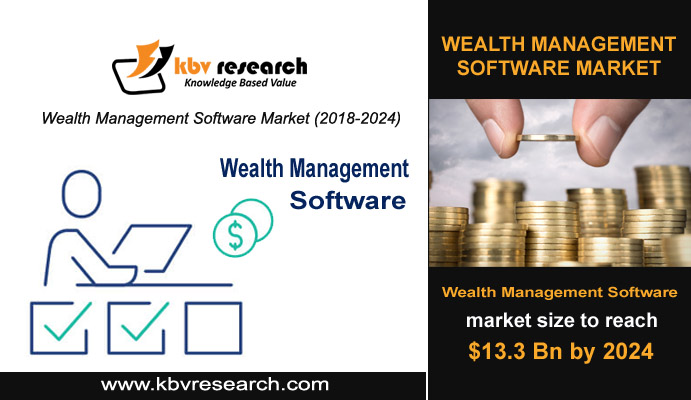Wealth Management Software to assist Wealth Managers
The primary objective is to be economically viable when it comes to finances. Nevertheless, accomplishing financial comfort is a long path
beginning from perseverance and patience to sensible investment. While people can save a lot of money on conventional methods, it takes skill to create and make investments. This is where the Wealth
Management Software technology steps in.
What is Wealth
Management and why is there a need for it?
Wealth management refers to a high-end, professional service that combines investment and financial advisory services. It also covers accounting and tax services, strategies for meeting certain financial goals over a period of time, and retirement planning. Estate and legal planning are
also part of the wealth services program. These special services are mainly offered to high net worth individuals (HNIs), who receive a highly trained wealth manager. The role of the wealth manager is to make recommendations for the allocation of his fund available to investors.
 |
| Wealth Management Software Market (2018-2024) | KBV Research |
A wealth advisor helps create a financial strategy through which clients can utilize their assets in such a way that most, if not all of their financial goals are met. The advisor helps ensure that money continues to compound, whether through sound investments or effective tax planning. It becomes extremely difficult to set and meet realistic goals unless their clients have a financial strategy in place. Identifying and understanding the financial strengths and challenges is important. Experts in wealth management can help put a plan into motion and monitor its progress periodically.
What is a Wealth
Management Software?
Wealth management systems are structured so that wealth managers can run their entire business life cycle from the front office to back office without having to incorporate multiple systems. It allows wealth management businesses to serve all types of customer segments including
high-profile individuals with high net worth, single and multi-family offices. Wealth management software supports customer management, financial consultancy, portfolio management, compliance, and customer reporting. Wealth management software promotes discretionary, non- iscretionary and consulting services.
Wealth Management
Software for wealth managing institutions
·
Banking
The global economy remains strengthened to manage
individuals' growing wealth and assets. Banks can use wealth management
software to ensure a customer-focused approach while managing individuals '
financial assets regardless of location. These platforms allow banks to expand
their portfolios of financial products and offer their customers sufficient
flexibility to create investment portfolios. Additionally, the open
architecture on which these platforms are built can potentially allow banks to
be integrated across a range of banking applications.
·
Investment
Management Firms
Optimized software is needed to manage investments, assess
risks and exposure, then re-allocate and share information with investors,
board members or other interested parties. Such software supports data
management, improves efficiency and productivity, and ensures compliance.
Platforms such as MAC, Windows, Windows/UNIX, web-based, etc. can access such
software. This software allows investors to decide where and in which company
they should make investments.
·
Trading
& Exchange Firms
Companies offer capital market and risk management wealth
management services. HNWIs and corporate groups are the main customers of
trading and exchanging companies. Companies offer online business services to
their customers for the convenient handling of wealth management tasks. Since
customers are increasingly inclined to trade and exchange to improve their
financial gains, this industry will sooner or later propagate at a high rate.
·
Brokerage
Firms
Most of the best stock agents are investors who can only
recommend, but generally do not act on the wider spectrum as financial
consultants. These recommendations can also be limited to the investment and
services offered by these companies as the registered representatives of larger
companies. Remembering these recommendations is also important. Eventually,
companies should be aware of potential conflicts of interest arising from
various compensatory approaches. The fee-based arrangements imposed by wealth
management are most often considered to favor impartial recommendations.
To employ or to not
employ a Wealth Management Software: Pros & Cons of the technology
Robo advisors are an enticing race of financial technology
in wealth management software. One of the greatest advantages of implementing
robotic advisors is the dramatically lower rates of financial assistance.
Temporary investment methods require the recruitment of a human financial
consultant who could cost more than 1% of the assets under management (AUM). On
the other hand, robot consultants charge a zero assistance charge of
0.25% while at the same time they simplify the process for future
investors.
The platforms also provide the added availability advantage
that allows users to observe and invest in assets regardless of time or
location. Additionally, robo advisors are easy to use and their asset list
virtually always outperforms active long-term investments, reducing the
likelihood of heavy-risk investments. Some of the most enlightening ways these advisors
transform the wealth management industry is by providing wealth management
services to all people. Since they do not need a high minimum balance to
be maintained, robo advisors are very advantageous to small net worth
investors.
Given these advantages, it is noted that robo advisors are
at possible risk of data theft as they are provided via a platform that manages
and contains financial data. This may be a decisive factor in the wide adoption
of robo consultants when there are various incidents involving data theft, such
as data breach. Another problem is the absence of human judgment. Removing
human involvement has its side, but eliminating human emotional judgment means
that its human clients are not fully understood. The performance of these platforms
is based on speculation that depends entirely on their methodology, but not on
all of them. Thus, the adoption of robo consultants could result in information
leakage that would obstruct the acceptance of wealth management software.
The Bottom Line
Wealth management firms are facing competition not only from
pure digital portfolio management platforms, but also from non-financial
players like Google. Millennials are outdoing Baby Boomers as the largest
generation, and women will soon monopolize a larger share of assets than ever
before. In addition, the global market for wealth
management software is estimated to emerge at a CAGR of 13.8% over the
forecast period.



Comments
Post a Comment